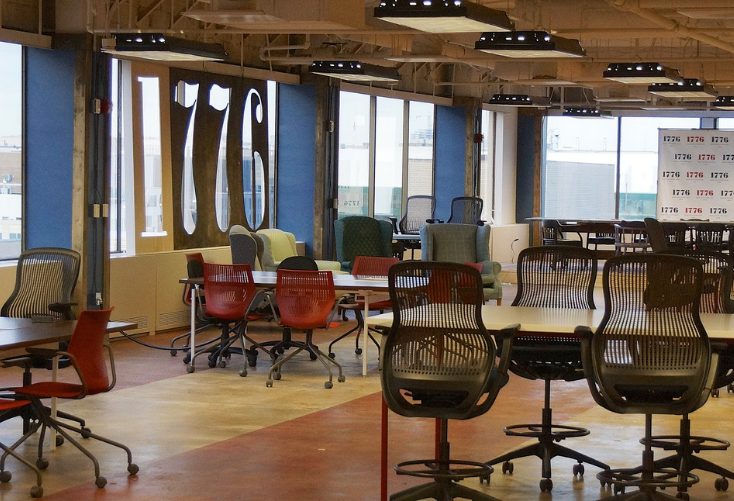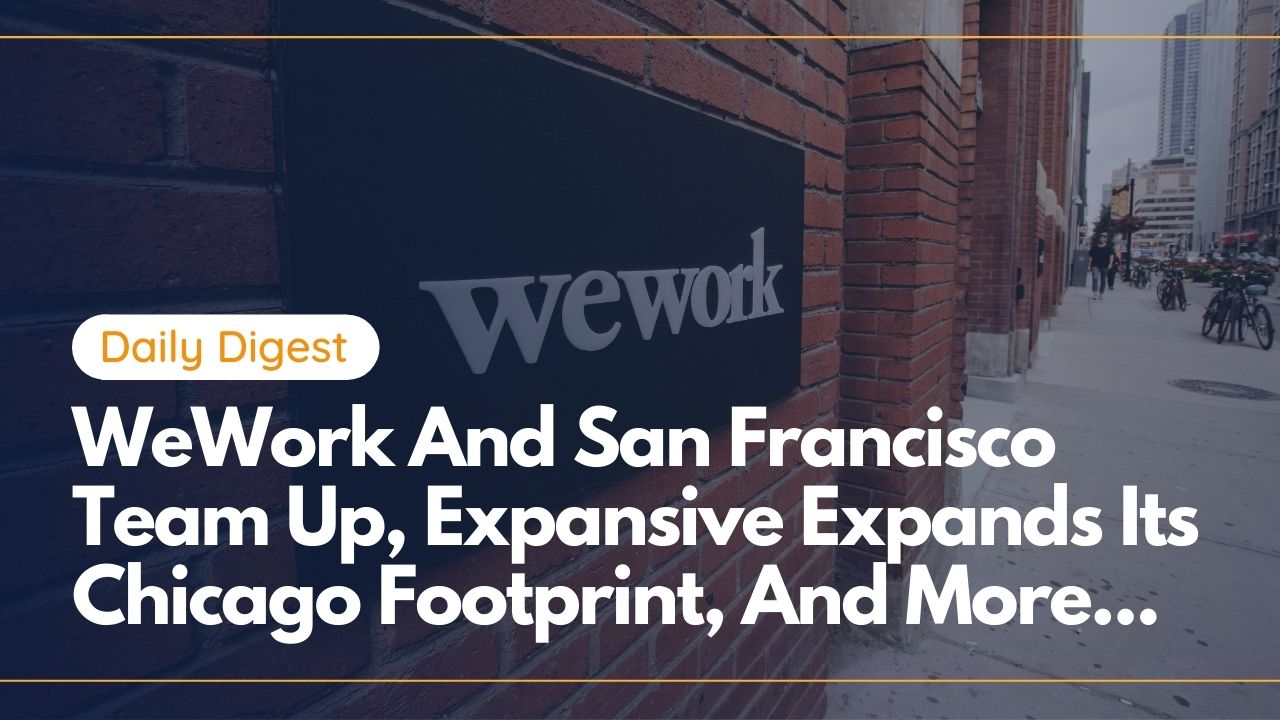Hand selected flexible workspace news from the most reliable sources to keep you ahead of the pack. We find all the latest news, so you don’t have to. Morning and afternoon updates. Stay in the know.
Here’s what you need to know today:
- The Humanization Of The Future Workplace
- Feedspot Reveals Top 60 Future Of Work Podcasts
- Demand For Office Space Is On The Uprise
- Google Saved Over $1 Billion Last Year
- Coworking Firm Closes D.C. Location
- How Remote Working Is Impacting Urbanization
The Humanization Of The Future Workplace
The era of ensuring companies are ready for the post-pandemic future is almost here. With this, organizations need to apply the new insights and capabilities that continue to emphasize the employee experience.
According to the annual Deloitte Human Capital Trends survey, 96% of respondents said organizations are responsible for employee wellbeing. However, 79% said that wellbeing is not incorporated into the workplace.
The human approach has never been more important than it is today as the past year has taught us. Despite the devastating impact the health crisis has had on the economy and employment, leaders now have a deeper understanding of what it means to create a work environment that supports and nurtures employees.
So how can organizations strengthen these traits and ensure that employees are satisfied, purposeful and engaged in the workplace?
First, set the enterprise mindset for the entire company. This means making it clear that humanization, as well as collaboration, is a top priority across the entire company.
Additionally, employers need to set clear goals in order for work to become a motivator. Giving employees a transparent view of the company’s bottom line gives them the opportunity to become more innovative when trying to meet those goals.
Lastly, it’s important to make sure that the company’s focus is on the future, not the past. By emphasizing future potential, staffers become more inspired to pursue new possibilities.

Feedspot Reveals Top 60 Future Of Work Podcasts
Feedspot recently revealed it’s Top 60 Future of Work Podcasts that explore the world of workplace culture, technology, real estate and more.
Ranked third on the list is the Future of Work Podcast by Allwork.Space. Since December of 2019, Allwork.Space has delved deep into the industry with its podcast that features interviews with experts that specialize in the human workplace experience.
The podcast, which has two episodes each month, covers topics that range from human resource trends to post-pandemic workplace design, as well as the flexible workspace industry, and everything in between.
During an era in society when the concept of the workplace has been turned on its head, the Future of Work Podcast tackles issues that are emerging such as the inevitability of remote working arrangements, nurturing workplace culture with a distributed workforce, adapting to the needs of younger workers, the ins and outs of the flex space industry and more.

Demand For Office Space Is On The Uprise
New analysis from the VTS Office Demand Index (VODI) shows that office demand skyrocketed in March.
The data found that demand rose 28% from February and 161% in the entire first quarter. Now, demand for office space is just 9% below pre-pandemic levels. At this pace, demand in April could meet or even exceed pre-pandemic rates.
Half of major markets, which include Chicago, Los Angeles, San Francisco and others, have exceeded or are within 5% of pre-pandemic levels. Some of these markets have a VODI within 10% of or above their historical average.
The first quarter saw major traction across cities like San Francisco, among the hardest hit during the pandemic, which saw a 276% quarter-over-quarter VODI growth. Although in the four months leading up to the pandemic San Franciso saw demand fall, it has rebound to levels that have not been achieved since October 2019.
Similarly, New York City also saw its VODI fall by 121 index points from March to May 2020. However demand has since grown, and as of March of this year, its VODI is 13% below the 2018-2019 average.
“The turnaround has truly been remarkable and is a testament to the resiliency of our country in the face of disaster,” said Nick Romito, CEO of VTS in prepared remarks. “Based on current momentum, I fully expect demand to continue to rise, although we should start to see incremental growth slow as we meet and then exceed pre-pandemic demand levels.”

Google Saved Over $1 Billion Last Year
Google parent company Alphabet Inc. saved $268 million in expenses during the first quarter of 2021 compared to the same time last year “primarily as a result of Covid-19” according to a new company filing.
With many Google employees still working from home and not traveling on the company’s dime, expenses for company promotions, travel and entertainment have plummeted.
Google is known for its well-amenitized offices featuring massage tables, catered lunches and corporate retreats. However, most staffers have worked without those perks since March of 2020.
This amounts to savings of over $1 billion on an annualized basis. In fact, Alphabet’s annual report from early this year showed that advertising and promotional expenses fell by $1.4 billion and travel and entertainment expenses dropped by $371 million last year.
The company plans to return to the office this year through a hybrid model, allowing the workspace to be less dense than pre-pandemic levels.

Coworking Firm Closes D.C. Location
Coworking network and incubator 1776 will close its Lafayette Square location in Washington D.C. at the end of the month.
This is the second time the company has shut down a D.C.-area location. In 2018, the firm closed its 15th Street space after closing its Crystal City and Arlington, Virginia locations. However, it reopened in D.C. at its current location and added an incubator in North Bethesda, Maryland.
“While we were hopeful that demand for the downtown D.C. market would pick up in 2021 as both vaccine distribution and interest in working in close proximity to the White House increased, we sadly have not seen significant changes and had to make the tough call to leave the District,” said Melissa Rucci, Director of Strategy at 1776.
Rucci added that the company views this a temporary departure, but was unable to identify an exact timeline of when 1776 could return to the area.
The company will continue to operate its spaces in Philadelphia and Indianapolis.
The Washington D.C. Economic Development Partnerships’ annual Development Report shows that the coworking industry as a whole has struggled in the market over the past year. For instance, the report found that WeWork closed three of its D.C. locations last year, with plans to shutter four more in 2021.

How Remote Working Is Impacting Urbanization
Remote working is the undisputed champion of the past year, allowing more room for work-life balance, expanded job opportunities and more.
However, the impact of this arrangement is still uncertain as its wide adoption is still in the early stages. With technology transforming society as a whole, it’s clear that these changes will echo beyond the workplace and redefine urbanization.
Remote working has been a critical reason why more people are shifting to underdeveloped countries with a lower cost of living, allowing these areas to experience their own growth.
Thanks to advanced internet connection and the increasingly distributed workforce, cities can be transformed to focus on being remote working havens, thus boosting their economy.
Although the health crisis has had a devastating impact on many developing countries, remote working actually opens the opportunity for more citizens to be able to work safely from their homes, boost their income and overall improve their standard of living
Since remote working eliminates the need for travel and more professional clothing expenses, people can actually use the money they are saving towards the economy and help enhance their quality of life. Even more, people have more access to better paid, remote opportunities for that they may not have had prior to the pandemic.




 Dr. Gleb Tsipursky – The Office Whisperer
Dr. Gleb Tsipursky – The Office Whisperer Nirit Cohen – WorkFutures
Nirit Cohen – WorkFutures Angela Howard – Culture Expert
Angela Howard – Culture Expert Drew Jones – Design & Innovation
Drew Jones – Design & Innovation Jonathan Price – CRE & Flex Expert
Jonathan Price – CRE & Flex Expert













